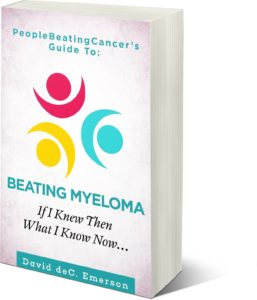- You are here:
- Home »
- Blog »
- Uncategorized »
- Myeloma Auto Stem Cell Transplants-65 Plus Want More than five years, right?
Myeloma Auto Stem Cell Transplants-65 Plus Want More than five years, right?
“Elderly multiple myeloma patients who underwent autologous stem cell transplants showed comparable benefits, which highlights the fact that chronological age alone should not be used to determine transplantation eligibility.”
The phrase is “transplant-eligible.” If you are 65 or younger and have no other health issues you are eligible for an autologous stem cell transplant (auto-hct). This therapy is both highly toxic and the standard-of-care for newly diagnosed MMers. According to the study linked below, it is safe and effective for MMers over the age of 65. This is an important finding considering that more than half of all newly diagnosed MM patients are over the age of 65. More than 15,000 MMers in 2018.
Safe and effective if your goal is to live for five years, that is…
This is the limitation of the study below. The end point is overall survival (OS) of five years. I think that most MMers, of any age, want therapies to measure more than the average five year survival average. The myeloma specialist James Berenson, M.D. has a published average survival of more than seven years. And Dr. Berenson doesn’t believe in or advocate autologous stem cell transplants. So that’s the limitation of the study below.
In my opinion, the more important finding that the study documents is that patients over the age of 65 who underwent an auto-hct during the years 1995-2006 (the pre-novel agent era) experienced a significantly lower percentage of five year survival. Fewer 65+ patients lived five years or more in the pre-novel agent era. I think it’s important for newly diagnosed MMers to know that oncology is making significant improvments in your care.
Examples of novel agents are the standard chemotherapy regimens for induction therapy. Agents such as Velcade and/or Revlimid.
At the same time, I think it’s important for newly diagnosed MMers to understand the limitations of today’s standard-of-care therapies. MM is still incurable. MM has an average five years survival of less than 50%.
If you are older than 65 you may very well have “co-morbidities” (health problems) that can complicate the high-dose, highly toxic approach that conventional oncology takes to MM treatment.
To learn more about evidence-based, non-toxic therapies scroll down the page, post a question or comment and I will reply to you ASAP.
Thank you,
David Emerson
- Cancer Survivor
- Cancer Coach
- Director PeopleBeatingCancer
Recommended Reading:
- Cancer Coaching Testimonials- PeopleBeatingCancer
- Angiogenesis Blood Vessel Activity May Predict Myeloma PFS, OS
- Myeloma Maintenance Beyond Lenlidomide/Revlimid
Comparing Efficacy and Safety of Auto-HCT in Older and Younger Patients With Multiple Myeloma
“The efficacy and safety of autologous hematopoietic stem cell transplantation (auto-HCT) performed during the era of novel agents was comparable between elderly and younger patients with multiple myeloma, according to results of a retrospective study published in Bone Marrow Transplantation.
Uncertainty remains regarding the risks and benefits of auto-HCT in elderly patients (≥ 65 years). Although there is evidence that select elderly patients with multiple myeloma can benefit from auto-HCT, most trials evaluating auto-HCT in multiple myeloma focused on younger patients (<65 years). This large, retrospective study was conducted to specifically examine the safety and efficacy of auto-HCT in elderly versus younger patients with multiple myeloma in a real-world setting during the era of novel agents.
…first auto-HCT with peripheral blood stem cells; use of melphalan alone (100 mg/m2, 140 mg/m2,and 200 mg/m2) as a conditioning regimen; no planned tandem transplantation; and auto-HCT received between 2007 and 2017. Of these patients, 287 were 65 years or older.As a historical control, data from 766 patients with multiple myeloma who received auto-HCT between 1995 and 2006 (pre novel agent era) were also evaluated in the survival analysis. The primary and secondary endpoints of the study were treatment-related mortality due to disease relapse or progression and overall survival (OS), respectively.
In the 2007 to 2014 cohort, the percentages of older (75.6%) and younger patients (95.0%) receiving high-dose (200 mg/m2) melphalan as a conditioning regimen were significantly different (P <.001).Using a propensity score-matched-pair analysis in which 263 patients from each of the 2 age groups were matched according to patient characteristics to adjust for selection bias, no differences were seen in 100-day treatment-related mortality for younger patients (0.4% [younger patients] vs 1.2% [older patients], or 1-year treatment related mortality (1.2% [younger patients] vs 1.6% [older patients]).
Analyses of rates of 5-year OS following auto-HCT in the 2007 to 2014 cohort showed no significant differences between age groups (62.5% [younger patient] vs 63.5% [older patients].
However, in the 1995 to 2006 cohort, 5-year OS rates were significantly lower for older patients (42.6%) compared with younger patients.
“We showed that auto-HCT is safe and effective for treating multiple myeloma in elderly patients, particularly in the era of novel agents,” the study authors wrote. “Elderly multiple myeloma patients who underwent auto-HCT showed comparable benefits, which highlights the fact that chronological age alone should not be used to determine transplantation eligibility.”


